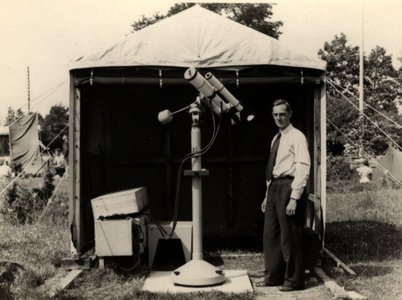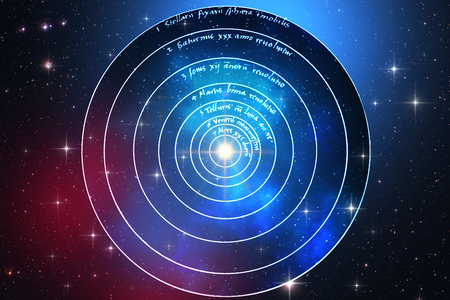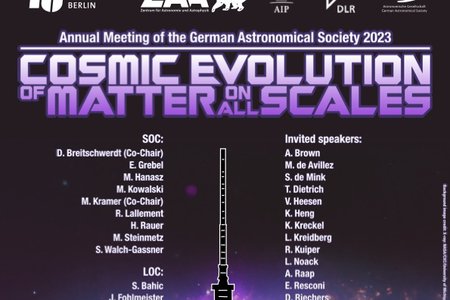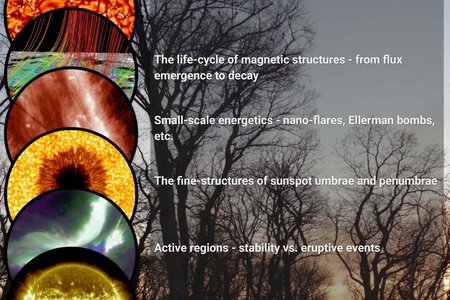Colloquium in Celebration of Horst Künzel’s 90th Birthday
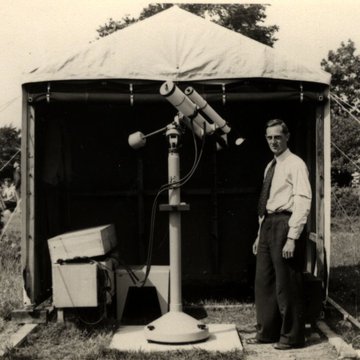
Horst Künzel preparing for the observation of the total solar eclipse on February 15, 1961 on the premises of the Barsarab winery in Romania.
Credit: AIP archiveOn Monday April 11, 2011, the Astrophysical Institute Potsdam honors its long-time colleague Horst Künzel with a festive colloquium on the occasion of his 90th birthday.
Künzel's professional and scientific career is unusual. In 1937, he began his apprenticeship as a precision mechanic at the Potsdam Astrophysical Observatory. In 1947, he passed his master craftsman's examination and two years later became chairman of the master craftsman's examination board. Without studying or completing a university education, he succeeded in earning a high reputation, also internationally, as an instrument maker, solar observer and researcher.
For almost 50 years, Künzel devoted himself in Potsdam to the study of sunspots and the structure of their magnetic fields. Besides extensive statistical work, he coined the term "delta spot", which is an extension of the magnetic classification of sunspots introduced by George Ellery Hale. Delta spots are closely associated with radiative eruptions on the Sun. The eruptive phenomena are so energetic that their effects affect even the Earth and are causative, for example, of the aurora. Even today, delta spots are an important topic of solar research, because here the interaction of solar plasma with strong magnetic fields can be observed under extreme conditions.
Guest speaker is Prof. Dr. Wolfgang Mattig from the Kiepenheuer Institute for Solar Physics in Freiburg, who will talk about the "Observation of solar magnetic fields at the solar observatory Einstein Tower".
The colloquium will take place at the Astrophysical Institute Potsdam (An der Sternwarte 16, 14482 Potsdam) in the lecture hall of the Schwarzschildhaus from 10:15 am to 12 pm.
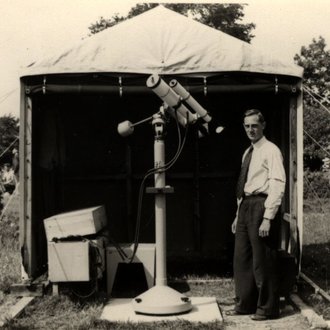
Horst Künzel preparing for the observation of the total solar eclipse on February 15, 1961 on the premises of the Barsarab winery in Romania.
Credit: AIP archiveOn Monday April 11, 2011, the Astrophysical Institute Potsdam honors its long-time colleague Horst Künzel with a festive colloquium on the occasion of his 90th birthday.
Künzel's professional and scientific career is unusual. In 1937, he began his apprenticeship as a precision mechanic at the Potsdam Astrophysical Observatory. In 1947, he passed his master craftsman's examination and two years later became chairman of the master craftsman's examination board. Without studying or completing a university education, he succeeded in earning a high reputation, also internationally, as an instrument maker, solar observer and researcher.
For almost 50 years, Künzel devoted himself in Potsdam to the study of sunspots and the structure of their magnetic fields. Besides extensive statistical work, he coined the term "delta spot", which is an extension of the magnetic classification of sunspots introduced by George Ellery Hale. Delta spots are closely associated with radiative eruptions on the Sun. The eruptive phenomena are so energetic that their effects affect even the Earth and are causative, for example, of the aurora. Even today, delta spots are an important topic of solar research, because here the interaction of solar plasma with strong magnetic fields can be observed under extreme conditions.
Guest speaker is Prof. Dr. Wolfgang Mattig from the Kiepenheuer Institute for Solar Physics in Freiburg, who will talk about the "Observation of solar magnetic fields at the solar observatory Einstein Tower".
The colloquium will take place at the Astrophysical Institute Potsdam (An der Sternwarte 16, 14482 Potsdam) in the lecture hall of the Schwarzschildhaus from 10:15 am to 12 pm.
Images
Horst Künzel preparing for the observation of the total solar eclipse on February 15, 1961 on the premises of the Barsarab winery in Romania.
Big screen size [1000 x 744, 110 KB]
Original size [1104 x 822, 120 KB]
